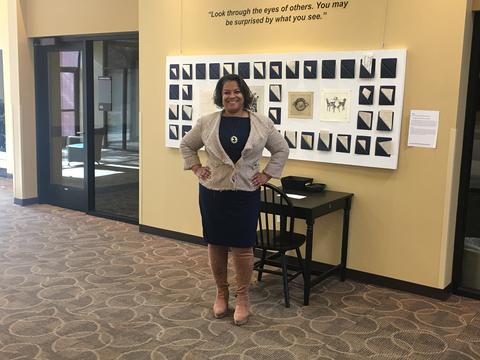
Meet Makeda

The University of Minnesota Robert J. Jones Urban Research and Outreach-Engagement Center (UROC) was still years away from opening when Makeda Zulu-Gillespie began working as its community liaison in 2006. A life-long Northside resident, she has helped UROC become what it is today by forging genuine connections between the community and the University of Minnesota.
The key, she believes, is building trust. And she did that the same way she has all of her life, by being honest, open and truthful. “I am a part of many communities,” she says, “we all are, and that’s what makes us who we are. If we value each other, we need to be in constant conversation, and understand that not all of those conversations are going to be easy.”
In September, after a multi-year search, Zulu-Gillespie was named Executive Director of UROC. In addition to her deep connections with both the Northside and the University, she brings to the position nearly 30 years of experience leading urban and community development.
Many people in the community, and on campus, already know Zulu-Gillespie. But whether you know her or not, you can learn more about her in this interview, in which she answers questions about the people and things that influence her leadership style.
What do you most want people to know about you?
I’m in a different role at UROC now, but I want people to know my foundation because I will continue to work from there. I highly value unity, self-determination, collective work and responsibility, cooperative economics, creativity, purpose and faith of individuals, communities and cultures. The communities that nurtured me are filled with authentic, confident people who lifted as they climbed.
Being raised in the Northside community has definitely shaped my personal style. I am a direct recipient of this community’s assets, and I understand the importance of continuing to nurture and expand those assets. I‘m also a proud graduate of Grambling State University and the Humphrey School of Public Affairs because of people who were living and working in this community. Holistic leadership means bringing your full self to all spaces, and I bring that I am a daughter, sister, aunt, wife, mother and grandmother, as well as a person of faith, cancer survivor and one of the Kwanzaa kids.
Describe your leadership style.
I enjoy working with staff, students and colleagues to achieve their personal goals, as well as the goals of UROC and its stakeholders. I think one of the challenges of me moving into this position is that some people may be looking for a person who likes to color inside the lines. I think there’s room for that, of course, but there’s also room to expand policies and transform the way communities and the University work together.
What does community mean to you?
For me, communities are the collectives that help you become who you are. Basically, I think of community two ways: as a group of people who have joined together because of likeness, geography, purpose, or culture; as well as a group of people working together toward a common goal.
Who has influenced you throughout your life?
I’ve been influenced by people who have used their struggles and challenges as a North Star to guide others. I’m also influenced by people who create ways for people to excel, who refuse to give up on themselves or others. The Way, Parents in Community Action (PICA) Head Start, Turning Point and Juxtaposition Arts, are just a few places I can name that are doing that kind of work. My church, Proverbs Christian Fellowship, and my aunt, Marcea Bland Staten Lloyd and my wonderful parents are also major influencers in my life. My family marched every January until Martin Luther King’s birthday was recognized as a national holiday—and that was back when winter was WINTER— with snow, cold wind and gray skies.
In what ways has the University of Minnesota played a role in your life?
The University has played a large role in my educational, personal and professional life. As a young person, I remember going to the University’s campus for events in what I called ‘the peppermint tent.’ My grandmother retired from the University’s bookstore in 1987, and my mom is a professional storyteller and actress, so I spent time on campus with her in and around the theater department. In high school, I spent a week on campus as part of an urban journalism workshop, which exposed teens to professional journalism. I was also based on campus for InRoads workshops, which helped kids of color prepare to work in corporate America. Years later, I was the executive director of a program called Quest for Excellence, a college prep program based on campus and funded by the Minneapolis Empowerment Zone. Most recently, I received my Master of Public Affairs degree at the Humphrey School of Public Affairs.
What do you see as UROC’s accomplishments so far?
I am proud of UROC’s reputation for high-quality community engagement in all areas of our work, from our community-driven research projects, to our outreach programs and activities. I aim to build on the relationships we’ve established and expand into areas that complement the work UROC has been doing with residents and community organizations and build on the legacies of past leadership.